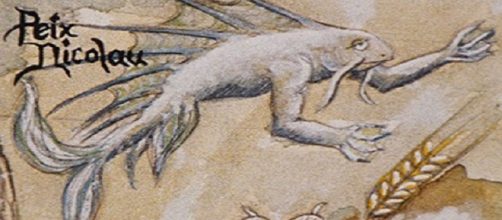La respiración y el sueño

Es importante volver a incidir en que Fray Benito Jerónimo, pese a su religiosidad, en todo momento huye de lo sobrenatural a la hora de buscar una explicación a los dones o capacidades extraordinariamente súper desarrolladas de estos dos seres humanos a la hora de desenvolverse en el medio acuático. A este respecto, señala que «en uno, y otro se ve una violentísima pasión por la vida acuátil, una fuerza, y habilidad extraordinaria para el ejercicio del nado; y en fin, la natural maravilla de pasar muchas horas sin el uso de la respiración (. ) El nadador Siciliano ordinariamente pasaba las noches en tierra, donde reposaba como los demás hombres. El Español continuadamente por espacio de cuatro, o cinco años, habitó las olas, donde no parece podía gozar el beneficio del sueño».
Buscar una explicación a cómo descansar y dormir bajo el agua quitaba precisamente el sueño al monje benedictino, quien reflexiona en su obra como sigue:
«Supuesta la verdad de estas Historias, no tiene dificultad alguna que nuestro Francisco de la Vega estuviese sin dormir los cuatro, o cinco años, que habitó el mar. La intemperie, que padeció su cerebro, fue, sin duda, grande, pues le desordenó tan extraordinariamente el juicio. ¿Qué hay que admirar, pues, que velase continuados cuatro o cinco años? Esto es salvar el hecho por la parte que parece más difícil; pues si se quiere decir, que en ese mismo tiempo tomaba algunas horas de sueño en no muy distantes intervalos, no hay en ello tropiezo alguno. ¿Quién le quitaba retirarse algunas noches a esta, o aquella orilla despoblada de tantas como baña el mar, y reposar en ella las horas que necesitase? Acaso podría dormir también en el mismo lecho del mar. (. ) Esta respiración, que los peces sumergidos logran, es claro, que no la podía gozar nuestro Nadante, por carecer de los instrumentos, que para ella tienen los peces. (. ) Pero a la verdad no veo yo, que conexión tenga la respiración con el sueño, ni por qué un hombre, que puede estar en el fondo del mar dos horas sin respirar, no pueda también sin respirar dormir allí otro tanto tiempo».
Men, women. and fish children

But the Galician friar goes further in his disquisitions and even dares to launch hypotheses regarding the existence of fish women, leaving aside possible prejudices if taken into account the context in which he lived. He wonders about the possibility of different-sex couples, their offspring and even what childbirth would be like:
«(. ) What the man from Liérganes did, some others could have done in previous centuries, not only men, but women, since all the strength, skill, inclination, and exercise in swimming that our man had was not odd in some individuals of this sex. And since a man and a woman were able to come together by common agreement (which could happen by innumerable accidents), from these by various successions could originate all the marine men and women who have been seen in different parts of the Ocean. Perhaps it would be difficult, how the work of generation, that of childbirth, and also the education of infants could be carried out within the waters. But in none of this I find difficulty, that is not very beatable; Well, about the fact that several deserted islets could serve all these trades, and the rocks themselves, which are a hindrance to navigators, and even many uninhabited shores of one and another Continent; There is no impossibility for the first two operations to be performed within the water, and as far as the third is concerned, the father and mother could alternate the care of holding the infant on the surface of the water for the time necessary to breathe, until the infant was able to swim like them. (. ) What impossibility, nor even what improbability is there that the crazy love of a man and a woman, for whom it was impossible to achieve the desired consortium on earth, would impel them to seek perpetual company in the free Republic of Fishes?»
La leyenda de 'Peix Nicolau', el hombre-pez de Mallorca


En las aguas del Mediterráneo han confluido las más bellas y mágicas leyendas. El Mare Nostrum, vital para saber quiénes somos y de dónde venimos, siempre ha sido el hogar de historias sobre fantásticos seres. Uno de ellos es el Peix Nicolau ("Pez Nicolás"), donde su leyenda aún es contada a la luz de la hoguera en algunos rincones de Mallorca.
